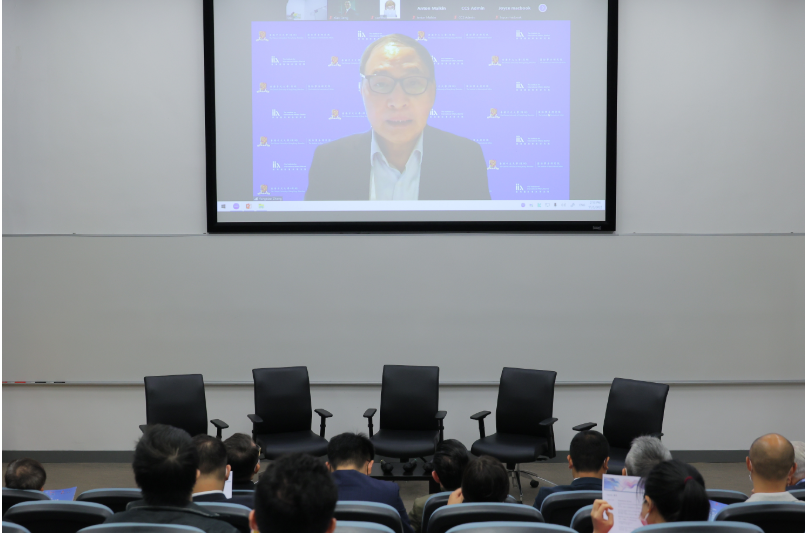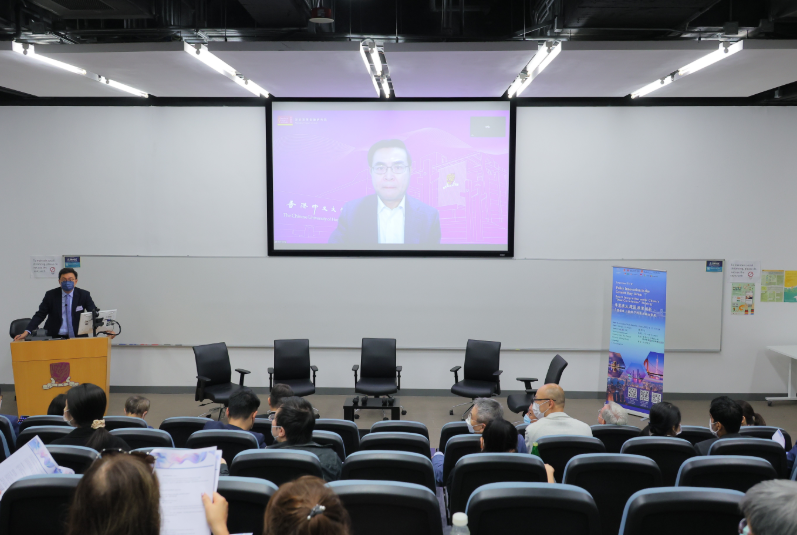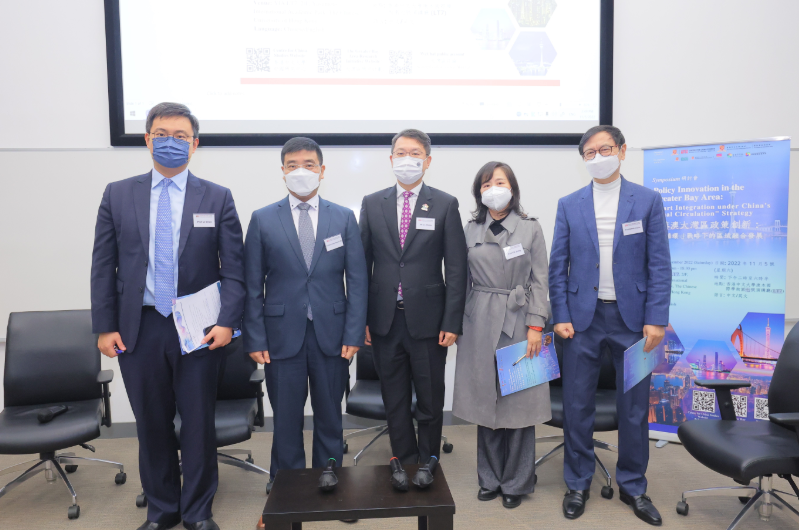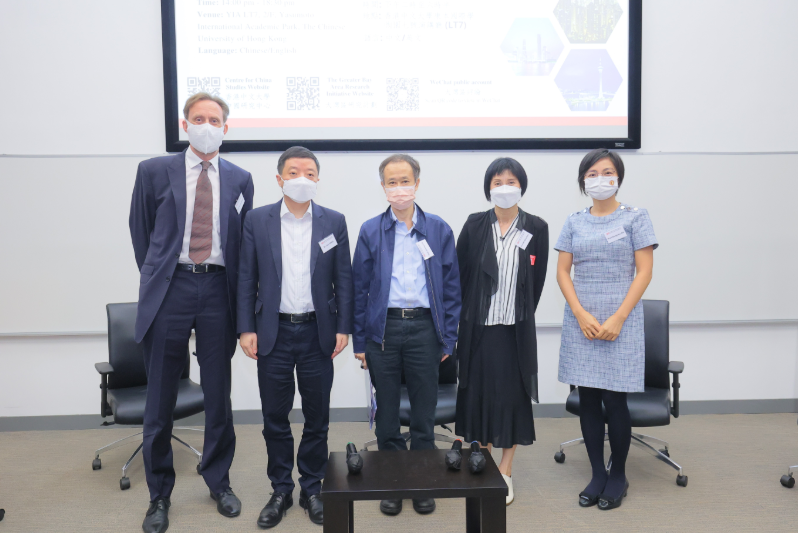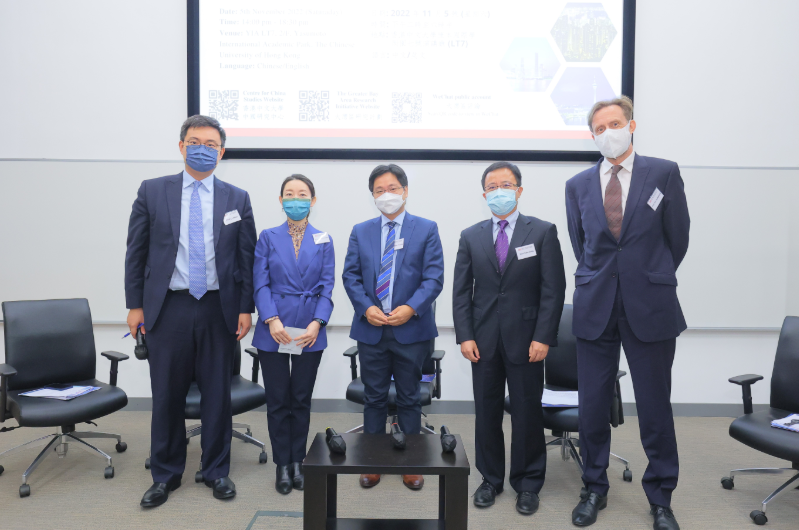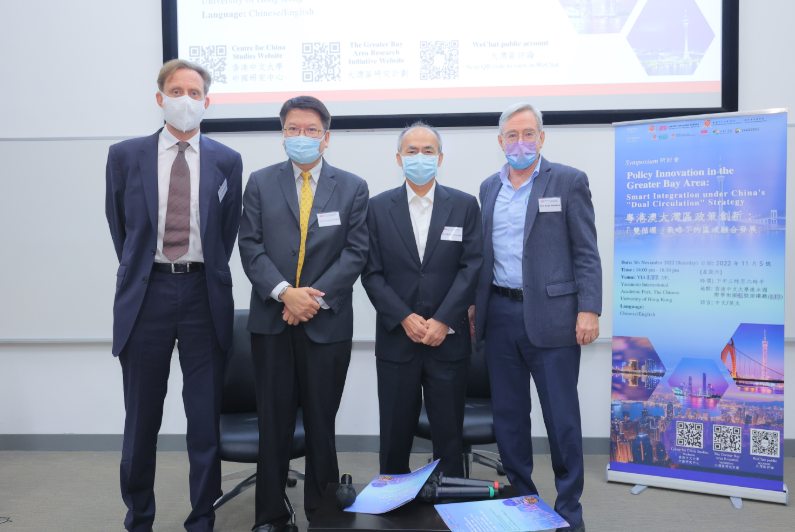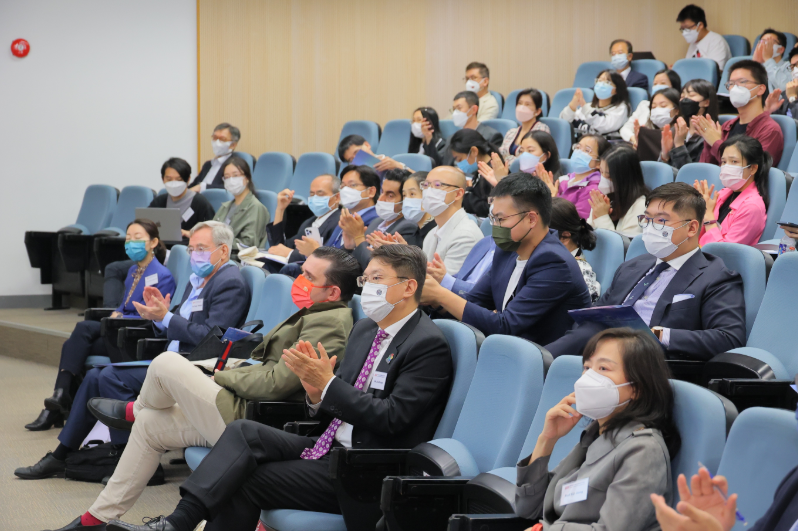On Saturday 5 November 2022, Centre for China Studies (CCS), CUHK and the Institute for International Affairs (IIA), CUHK (Shenzhen) successfully hosted a symposium entitled ‘Policy Innovation in the Greater Bay Area: Smart Integration under China’s “Dual Circulation” Strategy’. This event is also supported by Institute of Chinese Studies, CUHK; Institute of Policy and Practice of Shenzhen Finance Institute, CUHK(Shenzhen); Hua Jing Society; Hong Kong Institution for International Finance.
Following opening remarks from Mr Laurie Pearcey (Associate Vice-President [External Engagement and Outreach], CUHK), keynote speeches were delivered by Prof. Zheng Yongnian (Professor, CUHK Shenzhen; Director, The Institute for International Affairs, CUHK Shenzhen) on Governance, talent, and regional integration and Prof. Xiao Geng (Professor of Practice, CUHK Shenzhen; Director of Institute of Policy and Practice, Shenzhen Institute of Finance, CUHK Shenzhen; Chairman of the Hong Kong Institution for International Finance) on Finance, innovation, and dual circulation.
The keynote speeches were followed by in-depth panel discussions on policy innovation in the Greater Bay Area, featuring leading experts from the academic, policy and business community, including Dr. Hon. Hoey Simon Lee (M.H., JP. Member of the Legislative Council; CSO, China Resources [Greater Bay Area]); Mr Li Zhong (Member of the Standing Committee of China Overseas Friendship Association, Chairman of the Huajing Society); Prof. Wang Jixian (Research Director of the Bay Area Hong Kong Centre/Belt and Road Hong Kong Centre; Former Head of the Department of Geography of the University of Hong Kong); Prof. Xu Jiang (Associate Dean [Research], Faculty of Social Science, CUHK); Prof. Li Chen (Associate Professor, Centre for China Studies, and Research Fellow [by courtesy], Lau Chor Tak Institute of Global Economics and Finance [IGEF], CUHK); Dr. Joe Fang (Research Director, One Country Two Systems Research Institute); Prof. Carlos Lo Wing-Hung (Department Head, Department of Government and Public Administration, CUHK); Prof. NG Mee Kam (Vice-Chairman of the Department of Geography and Resource Management, Associate Director of the Institute of Future Cities and the Hong Kong Institute of Asian Pacific Studies, CUHK); Prof. Dongshu Ou (Associate Professor, Department of Educational Administration and Policy, CUHK); Prof. Tim Summers (Assistant Professor, Centre for China Studies, CUHK; Associate Fellow with the Asia-Pacific Programme at Chatham House); Dr. Hon. Wendy Hong Wen (Member of the Legislative Council; Head of Research at the New World Development); Prof. Zeng Tieyong (Director, Center for Mathematical Artificial Intelligence, Department of Mathematics, CUHK); Prof. Xia Jiang (Professor, Department of Chemistry, Professor [by courtesy], School of Life Sciences, CUHK); Prof. Terence Tai Leung Chong (M.H., Associate Head of New Asia College, Executive Director of Lau Chor Tak Institute of Global Economics and Finance [IGEF], CUHK); Dr. Tse Kwok Leung (Senior Research Fellow [Honorary] of Lau Chor Tak Institute of Global Economics and Finance [IGEF], CUHK; Former Head of Economic Research Division at Bank of China [Hong Kong]); Prof. Thomas Hugh (Associate Professor, School of Management and Economics, CUHK Shenzhen); Prof. Anton Malkin (Assistant Professor, School of Humanities and Social Sciences, CUHK Shenzhen).
The Guangdong-Hong Kong-Macao Greater Bay Area (GBA) refers to the area covered by nine cities in Guangdong province and the two special administrative regions (SARs) of Hong Kong and Macao. It is one of the most vibrant and international regions of contemporary China. In February 2019, China’s central government issued the outline development plan for the GBA. The plan envisaged an important role for the GBA in the next stage of China’s development, as a region which could help enhance China’s global competitiveness and innovation strengths. The existing strengths of this region, combined with this policy vision, point to many opportunities to build a modern, innovative and developed region.
The context is, however, a challenging one. Covid-19 came in the midst of an intensifying strategic rivalry between the US and China and challenges to globalisation as a major trend in international political economy. The central government has responded to these challenges with an economic strategy of “dual circulation” which emphasises the importance of domestic demand alongside a resilient approach to engaging with the global economy. Within the GBA, integration and connectivity remain constrained by a variety of institutional gaps and policy barriers. Hence the need for “smart” integration in the GBA. This will require policy innovation which responds to the global, national and local context. Co-organized by researchers at CUHK and CUHK Shenzhen, this symposium has engaged with the key policy and public debates across the range of issues facing the GBA development.
「粵港澳大灣區政策創新:『雙循環』戰略下的區域融合發展」研討會成功舉辦
面對百年未有之大變局,中國將加快構建以國內大循環為主體、國內國際雙循環相互促進的新發展格局,通過順暢聯通的「雙循環」,提升發展的自主性、可持續性和韌性。粵港澳大灣區是中國最具活力和最國際化的地區之一,是「雙循環」的重要銜接帶。在回顧近年實踐的基礎上,如何更好的發揮大灣區現有優勢,進一步推動高質量區域融合發展?這就需要大灣區進行「智慧」整合,並針對全球、國家和地方的新情況展開政策創新。
在此背景下,由香港中文大學中國研究中心(CCS)和香港中文大學(深圳)國際事務研究院(IIA)聯合主辦,香港中文大學中國文化研究所、香港中文大學(深圳)高等金融研究院政策與實踐研究所、香港華菁會、香港國際金融學會協辦的「粵港澳大灣區政策創新:『雙循環』戰略下的區域融合發展」主題研討會於11月5日在香港中文大學康本國際學術園成功舉行,就大灣區發展所面臨的一系列重要政策展開了深入討論。
本次研討會由香港中文大學協理副校長(校外聯繫與推廣)金江先生致歡迎辭,香港中文大學(深圳)國際事務研究院院長鄭永年教授、深圳高等金融研究院政策與實踐研究所所長肖耿教授擔任主旨演講嘉賓。研討嘉賓包括李浩然博士(M.H.,JP.香港特別行政區立法會議員;華潤集團粵港澳大灣區首席戰略官)、李中先生(中華海外聯誼會常務理事、香港華菁會主席、深圳前海青年專業諮詢委員會副主任)、王緝憲教授(大灣區香港中心/「一帶一路」國際合作香港中心研究總監;前香港大學地理系主任)、徐江教授(香港中文大學社會科學院副院長、地理與資源管理系教授)、黎晨教授(香港中文大學中國研究中心副教授,劉佐德全球經濟及金融研究所禮任研究員)、方舟博士(一國兩制研究中心研究總監)、盧永鴻教授(香港中文大學政治與行政學系教授及系主任)、伍美琴教授(香港中文大學地理與資源管理學系副主任,未來城市研究所及香港亞太研究所副主任)、歐冬舒教授(香港中文大學教育行政與政策學系副教授)、洪雯博士(香港特別行政區立法會議員,新世界發展有限公司研究主管)、曾鐵勇教授(香港中文大學數學系教授,數學人工智能中心主任)、夏江教授(香港中文大學化學系教授,生命科學學院禮任教授)、夏添恩教授(香港中文大學中國研究中心助理教授,查塔姆研究所亞太項目副研究員)、莊太量教授(M.H.,香港中文大學新亞書院副院長,劉佐德全球經濟及金融研究所常務所長)、謝國樑博士(香港中文大學劉佐德全球經濟及金融研究所名譽高級研究員,中銀香港經濟研究前主管)、譚安厚教授(香港中文大學[深圳]經管學院副教授)和Anton Malkin教授 (香港中文大學[深圳]人文社科學院助理教授)。本次研討會由黎晨教授和夏添恩教授策劃和主持。
For further highlights of the symposium, please visit:
更多研討會片段,請瀏覽:

